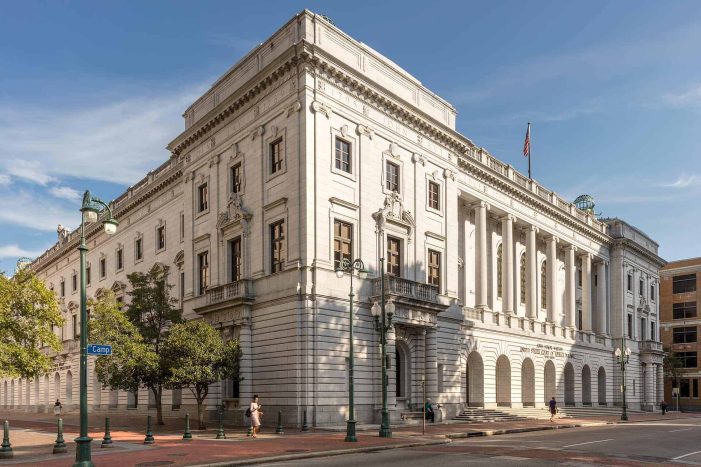COVID-19 Vaccine Mandate for Federal Workers Reinstated by Fifth Circuit Court of Appeals

On Apr. 7, 2022, the Fifth Circuit Court of Appeals in New Orleans, Louisiana ruled that the Biden administration’s COVID-19 vaccine mandate for all Federal workers must be reinstated. The 2-1 ruling reversed a lower court order blocking the vaccine mandate for federal workers. Fifth Circuit Court of Appeals Judge Carl Stewart ordered the lower court to dismiss the case.1
In September 2021, the Biden administration announced that all federal workers were required to receive the COVID vaccine. Although medical and religious exemptions were permitted, non-exempt federal employees could face disciplinary charges including counseling, suspension and termination if they did not comply and receive the controversial vaccine. Feds for Medical Freedom, a group of 6,000 members, challenged the mandate and sued the Biden administration.
On Jan. 21, Judge Jeffrey Brown of the U.S. District Court for the Southern District of Texas sided with the plaintiffs and effectively placed the COVID vaccine mandate for federal workers on hold. The Fifth Circuit Court of Appeals ruling means that the U.S. government successfully appealed the decision.2 3
Court of Appeals Ruled Federal Judges Do Not Have Jurisdiction Over Federal Employees
The Court of Appeals found that the lower court decisions fail because a federal judge does not have jurisdiction over federal employees challenging the vaccine mandate and redress is found exclusively under Civil Service Law.4 The court agreed with the government’s position that the federal employees, by filing this federal lawsuit, were circumventing the Civil Service Reform Act (CSRA), which was implemented to protect employees from unfair or unwanted practices.5
The CSRA prevents federal employees from filing a lawsuit prior to facing discipline for challenging a federal employment regulation. After adverse employment action is taken, federal employees looking to appeal must file an appeal with the Merit Systems Protection Board prior to filing an action with the U.S. Court of Appeals for the Federal Circuit. The Court said that if the Plaintiffs wanted to take pre-enforcement action, they could have filed a complaint with the Office of the Special Counsel and argued that personnel practices precluded a COVID vaccine mandate.6
Judge Stewart wrote:
The plaintiffs could have challenged an agency’s proposed action against them before filing this suit and certainly before getting vaccinated…The plaintiffs here seek to avoid discipline for failing to comply with [the executive order].7 8
Concluding that the CSRA precluded the district court’s jurisdiction and invalidated the preliminary injunction, the Court stated:
The Supreme Court has thus explained that, “[g]iven the painstaking detail with which the CSRA sets out the method for covered employees to obtain review of adverse employment actions, it is fairly discernible that Congress intended to deny such employees an additional avenue of review in district court.. “the CSRA provides the exclusive avenue to judicial review when a qualifying employee challenges an adverse employment action by arguing that a federal statute is unconstitutional.9
Administration Argued President Has Same Authority Over Federal Employees That CEOs Have Over Corporate Employees
The Biden administration argued that the U.S. Constitution grants the President the same authority over the federal workforce that a CEO has over a private corporation. The plaintiffs argued that the recent U.S. Supreme Court ruling, which prevents the federal government from forcing private employers to require that their employees to get the COVID vaccine, precludes President Biden from ordering all federal workers to get the vaccine.10
Fifth Circuit Court of Appeals Judge Rhesa Hawkins Barksdale, who wrote a dissenting opinion, disagreed that the Biden administration Executive Order (EO) requiring all federal employees to receive the COVID vaccine falls within the purview of the CSRA. She said the case was appropriately adjudicated by the U.S. District Court.
In her dissent, she stated that the EO is not subject to the CSRA, in part, because the CSRA applies to federal employees, “facing proposed actions by an employing agency” and not a sweeping mandate by the President, which is the current case. Further, she pointed out that the CSFA applies to individuals who suffered adverse action, and not entire classes of people who are required to receive a vaccine or be subject to adverse action like in the present case.11 Judge Hawkins Barksdale wrote:
The EO’s enactment, however, does not constitute an adverse action subject to CSRA. The case at hand is instead a pre-enforcement challenge to a government-wide policy, imposed by the President, that would affect the 2.1 million federal civilian workers, including the 6,000 members of Feds for Medical Freedom. Relief plaintiffs seek does not fall within the purpose of CSRA. Enacting the EO and then requiring federal civilian employees who may later receive adverse action to seek relief now through CSRA would result in the very type of lengthy and haphazard results CSRA was enacted to prevent.12>
The two judges signing the majority opinion, Judge Stewart and Judge James Dennis, were appointed by President Bill Clinton. Dissenting Judge Hawkens Barksdale was appointed by George H. W. Bush.13
If you would like to receive an e-mail notice of the most recent articles published in The Vaccine Reaction each week, click here.
Click here to view References:
No comments:
Post a Comment